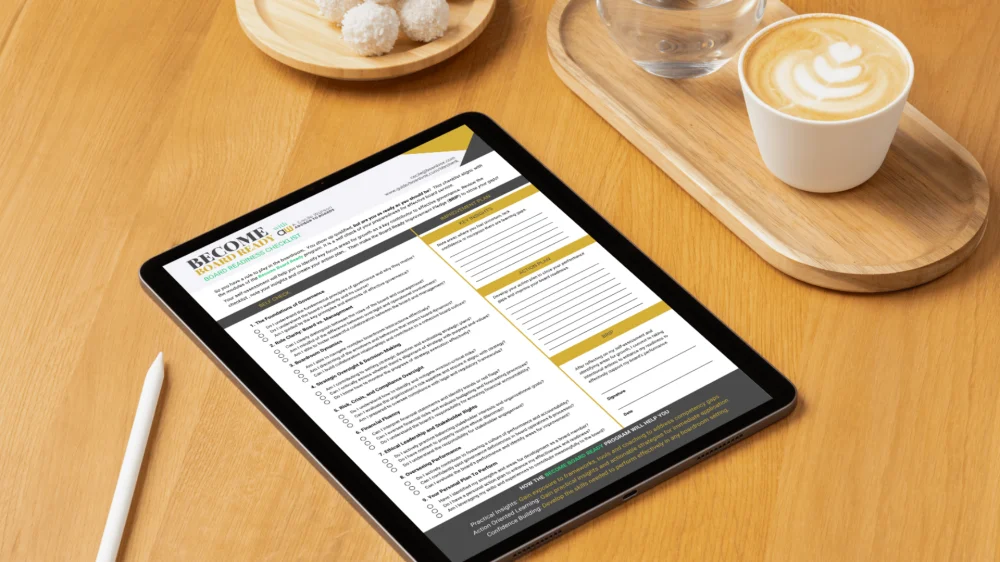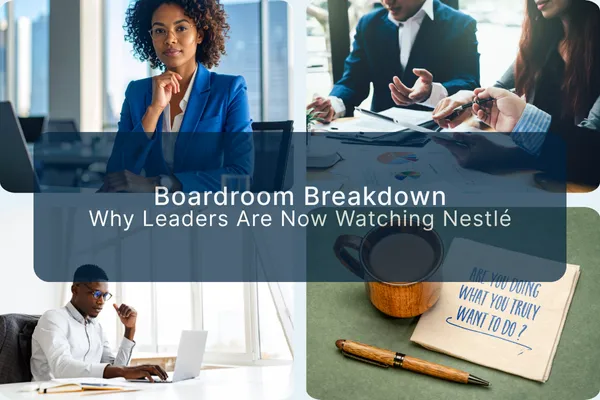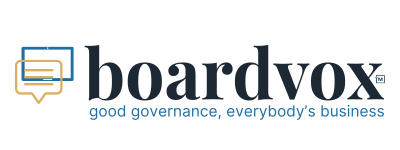Empowering
Good Governance Through You
... one board at a time
Download the Checklist and take the first step toward joining the Become Board Ready Program.
Download the Checklist and take the first step toward joining the Become Board Ready Program.
How we help
We are the
Voice, Tone and Expression of Good Governance
helping organizations to realize their full potential
by educating, informing, and supporting boards,
directors, and c-suite leaders
with the training, tools and services
to create the best value for today and the future.
How we help
We are the Voice, Tone and Expression of Good Governance
helping organizations to realize their full potential
by educating, informing, and supporting boards, directors, and c-suite leaders
with the training, tools and services to create the best value for today and the future.

Board & Director
Training
We support directors and c-suite leaders to be their best in the boardroom with coaching, workshops & online training.

Board Performance
Tools
We administer board evaluations, board improvement plans and provide technology to support improving board performance.

Board Operating
Support Services
We support boards to become more effective by offering services such as retreat facilitation, policy templates and admin tools.
Let's reimagine the future of board development.
We believe that every director holds the key to unlocking extraordinary boardroom potential. We also believe that the power to unlock sustainable economic growth resides with people just like you right there in the boardroom. Reputational risks are at an all time high. And board service is important work deserving of the best hearts and minds.
That's why we're making governance easier for smarter boards by helping directors embrace their profound responsibility and forge a path of independent thinking, ethical leadership and championing good governance.
Coming Soon!
Join The Waitlist for Become Board Ready
This checklist is your entry point to the
Become Board Ready Program ...a guide designed to empower directors and aspiring board members to excel in their governance roles.
Download the checklist and get waitlisted for Cohort II of Become Board Ready
Elevate Your Governance Expertise: Master the key principles that drive effective board leadership.
Strengthen Board Dynamics: Foster alignment, trust, and a shared understanding in the boardroom.
Confidently Navigate Your Role: Clarify your responsibilities and deliver value with confidence.
Enhance Strategic Oversight: Stay focused on purpose, accountability, and long-term success.

This checklist is aligned with the proven modules of our Become Board Ready program, so you can start assessing and addressing your readiness immediately.
Complete the form and you'll receive the Board Readiness Checklist directly in your mailbox.
Privacy Disclaimer:
We respect your privacy. The information you provide will only be used to deliver your checklist and occasional updates about governance insights and resources. We will never spam you, sell, or share your information with third parties.
RED FLAGS IN THE BOARDROOM CHECKLIST
Add it to your Board Engagement Toolkit to have a handy guide empowering you to:
Identify potential governance risks early
Be vigilant and avoid corporate governance failures.
Uphold the highest standards of transparency and ethics.



Boardroom Breakdown: Why Leaders Are Now Watching Nestlé
Nestlé’s recent leadership turbulence is more than a corporate headline. It is a warning for every board and C-suite team. Three CEOs in two years, two forced out under difficult circumstances, and a longtime chair stepping down early amid shareholder pressure, all under global media scrutiny. The result was a crisis of confidence that hit not only the board’s credibility but also the company’s performance.
The lesson is clear: once confidence falters, every subsequent decision is judged more harshly. And the blowback does not stop at the board table. It reverberates through management, investors, employees, and markets. Families lose income, reputations take a hit, and shareholder value drains away. Nestlé’s saga underscores a truth too often forgotten: good governance is everybody’s business.
Directors and executives everywhere should be watching Nestlé closely. Governance failures do not just erode reputation. They drain focus, destabilize leadership, and undermine performance. Nestlé’s experience is a visible case study of how accountability plays out in real time and why stability and renewal are both non-negotiable.
Nestlé’s appointment of Pablo Isla as chair is seen as a steadying move. Isla, a respected lead independent director and vice chairman since 2018, brings deep company knowledge and proven turnaround ability from leading Inditex, the parent of Zara. His presence aims to guide Nestlé through uncertainty with steady hands while reinforcing the need for ongoing board refreshment.
A. What Happened
In 2017, Nestlé appointed Ulf Mark Schneider as its first external CEO in nearly a century, aiming to drive transformation. In 2024, Schneider departed amid growing concerns.
The board reacted by choosing Laurent Freixe, a 40-year Nestlé veteran, but he was dismissed less than a year later for breaching the company’s code of conduct, triggering further scrutiny.
Chair Paul Bulcke, a 46-year company veteran who was appointed Chair in 2017, faced rising shareholder dissent and stepped down early in 2025.
Pablo Isla, lead independent director and vice chairman since 2018, took over as chair in October 2025, providing experienced, calm leadership during a volatile period.
B. A Board's Eye View on the Nestlé Saga
Nestlé’s turbulence shows how governance is judged not in isolated moments, but in hindsight—where decisions form a pattern. Once something goes wrong, every subsequent decision is judged more critically, and the board must work harder to restore confidence.

1. Credibility is Judged by The Moment and Confirmed by The Track Record
Three Nestlé CEOs in less than two years unsettled investors and employees. Each appointment had its rationale, but in hindsight the succession looked like instability. A single moment can put credibility under pressure, but the sequence of decisions is what confirms whether confidence is rebuilt or eroded.
Lesson: After one high-stakes misstep, every new decision carries more weight. A single moment can damage credibility, but it is the track record of decisions that determines whether trust is restored or lost.
2. Accountability Is Immediate, Consequences May Linger
When concerns about Freixe surfaced, Early board responses were viewed as slow and insufficiently rigorous, which allowed doubts about oversight to grow. By the time action was decisive, confidence in board oversight was already dented.
Lesson: Boards cannot afford half-measures on accountability. Stakeholders expect clear, timely enforcement at every level. Delays in standards enforcement weaken trust.
3. Departures from Best Practice Can Come Back to Bite
Bulcke’s move from CEO straight to chair was allowed by company rules but departed from global best practice. Years later, shareholder pressure forced his early exit, underlining how yesterday’s judgements can become tomorrow’s trust issues.
Lesson: Departing from best practice heightens the risk of your judgment being found wanting. What seems reasonable today may be questioned as a misstep tomorrow.
4. A Single Crisis Is Rarely Ever Judged In Isolation
Firing Freixe for a code breach was undoubtedly the right thing to do. But in the context of prior CEO turnover and board dissent, even decisive actions were read as part of a pattern, not a reset.
Lesson: Boards must be mindful that decisions are rarely ever judged in isolation. Rebuilding trust demands not just the right call, but consistency over time.
5. Independence Anchors the Board When Stakeholder Trust Falters
Isla’s appointment as chair, as a respected independent director, was welcomed for restoring stability and trust ...where more internal continuity could not.
Lesson: Independence on the board is essential, especially in turbulence. Without it, boards risk being seen as self-protective rather than principled.
C. In Closing ...
Nestlé’s story is not about one governance breach, but how confidence unravels when board decisions, each defensible in context, form a pattern stakeholders distrust.
Don’t measure decisions only by today’s rationale. Consider how they’ll look in hindsight.
Don’t assume one strong action resets confidence. Credibility is rebuilt over a sequence, not a single call.
Understand governance codes before you depart from them. Every deviation is a choice for which you are accountable, and one that may carry consequences if judged poorly in hindsight.
Ensure strong independent voices can steady the board when turbulence hits.
Remember that stability and renewal must go hand in hand. Refreshing the board at the right intervals strengthens accountability and signals to stakeholders that oversight is active, not complacent.
Boards are not judged by avoiding turbulence ...that’s inevitable. They are judged by whether their decisions show consistency, independence, and foresight in the eyes of those whose trust they rely on.
And that is why directors and executives everywhere should be watching Nestlé: not to point fingers, but to recognize how accountability plays out in real time and to ensure their own decisions stand stronger when hindsight arrives.
Bold Leadership. Ethical Governance. Meaningful Impact. That's the charge. Carry it Forward!
Enjoyed this article? Subscribe to never miss an issue.
Drop me a note and share your best board leadership stories.
Stay tuned for more perspectives on bold leadership, ethical governance and meaningful impact insights. And if you haven't already, be sure to subscribe so you never miss a post. Together, we're set to build better boards and build boards better by reshaping the landscape of boardroom leadership, one director at a time.
🌐💼 #BecomeBoardReady #strategy #BoardDevelopment #CorporateGovernance #GoodGovernance #BoldLeadership #EthicalGovernance #BoardPerformance #boardvox 🤝🔍
Know someone who might be interested in this blog? Please be sure to share it with them.
Also be sure to follow our boardVOX WhatsApp channel here. It is Especially for directors, c-suite leaders, corporate secretaries and all interested in good governance.
YES, YES ...I GET IT
This is exactly what I need right now.
I'm seeking a network of professionals who understand the challenges of the boardroom.
I want to elevate my leadership and have a real impact in the boardroom.
Continuous learning is crucial in our field, and I'm eager to stay ahead.
I believe in the power of good governance to shape the future of business and communities.
If this sounds like you, then DIVE RIGHT IN!
Join Our Movement As
A Partner In Good Governance.
We're here to help you avoid the SHOULD'VEs and COULD'VEs in fulfilling your responsibilities as a director.

